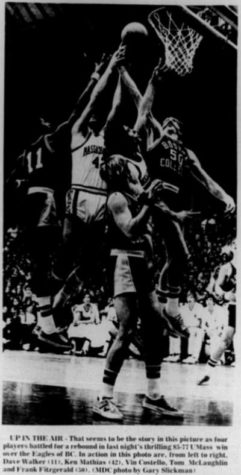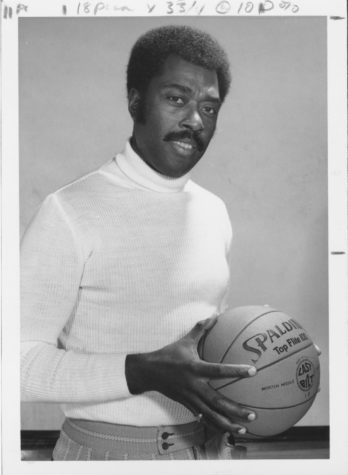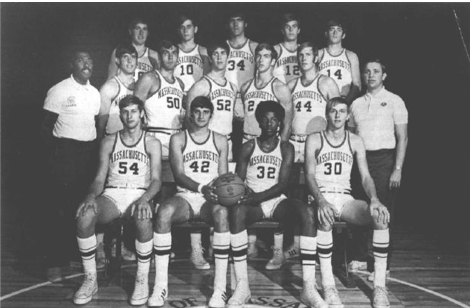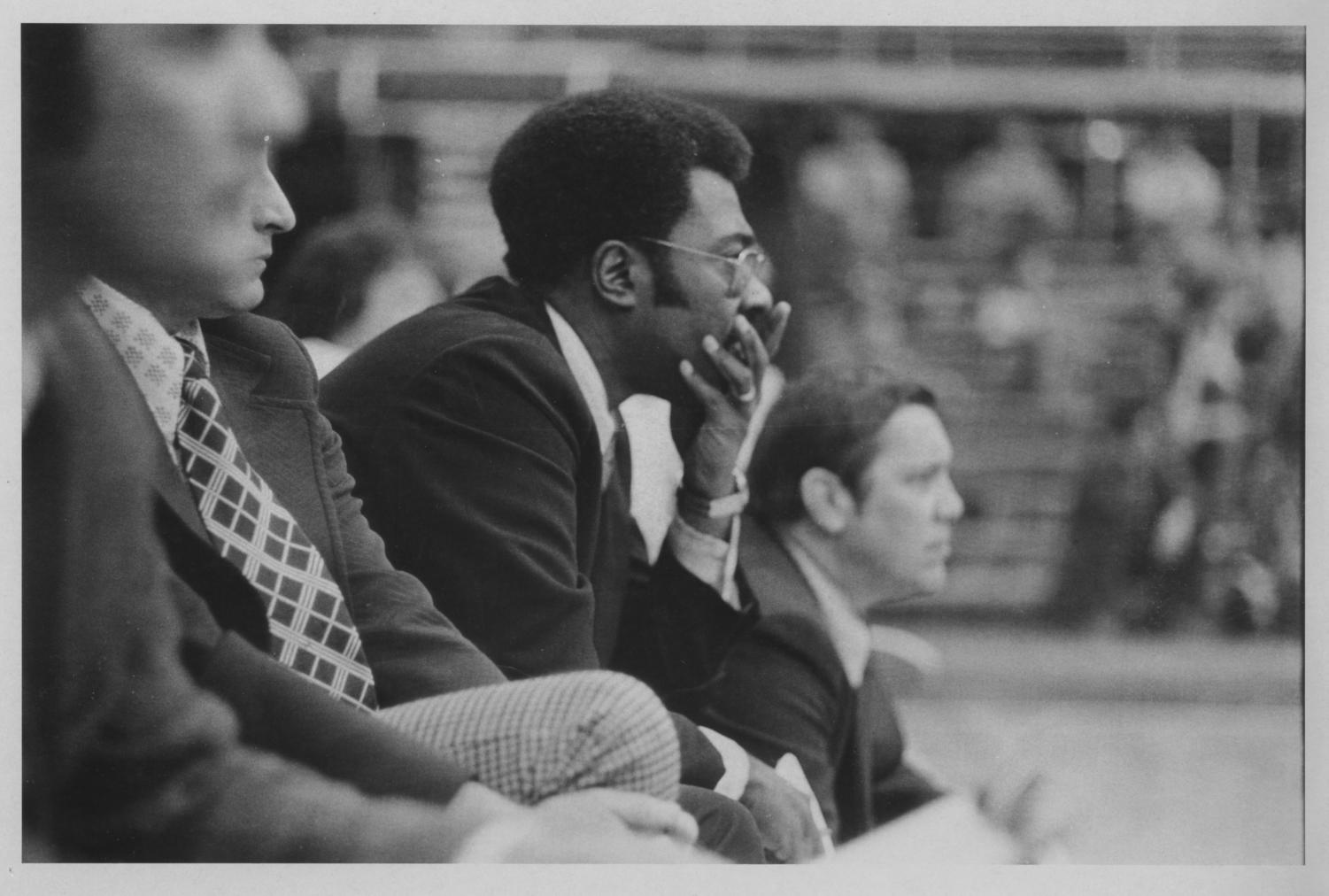Ray Wilson: The forgotten orchestrator of UMass men’s basketball’s golden years
Not a household name, Wilson was quietly responsible for UMass' winningest run
May 4, 2021
The Massachusetts basketball team was working its way through the UMass campus. The team had just finished up a pregame meal at 4 o’clock on Feb. 9, 1971. The sun sat low in the western Mass. sky as the players snaked their way towards Curry Hicks Cage. The temperature had fallen below freezing since they’d gotten to the dining hall at 3 p.m. However, when Curry Hicks Cage came into view, there stood a line of students down the street waiting to get in.
Tipoff was still four hours away, but UMass students wanted to be sure they’d have a seat to watch Julius Erving and Co. take on Boston College at 8 o’clock that night. The Eagles—maybe the most well-known and well-respected basketball programs in New England—hadn’t lost to UMass since 1964. And while UMass had already disposed of fellow New England powers Rhode Island, Connecticut, Boston University and Holy Cross that season, the BC matchup meant a little extra.
A year prior UMass fell to the Eagles 83-76, its largest loss outside of a 10-point loss to 15th-ranked Pennsylvania. That, in conjunction with the fact that UMass was 12-4 all-time against BC left the team—and its fans—with an extra incentive to win.

The scene outside of the Cage wasn’t out of the ordinary for the early 70s. Fans flocked to the doors of the small, brick building to try to see “Dr. J” soar and that Tuesday afternoon was no different. The official attendance of the game was 4,400 people crammed into the small gymnasium. Tom McLaughlin, a transfer from Tennessee, thinks that listed attendance was an understatement.
“Wally Novak who was the ticket manager,” McLaughlin said, “I used to ask him and he said, ‘Tom, we had 6,000 people in that building.’ The fire marshals got so mad at them having so many people in it. They said to them, ‘You have to count.’ So they gave these kids clickers that were counting the students coming in.”
Whether it was 4,000 or 6,000, the fans in attendance were treated to a show. UMass beat the visiting Eagles 85-77 in what head coach Jack Leaman called “the biggest game of the year,” after the game.
The win was one of 217 in Leaman’s tenure, the most ever in UMass men’s basketball history. He captured eight Yankee Conference championships. He sent two players to the NBA. For many, Leaman’s time represented a golden era in UMass history.
Testaments to the key cogs in those teams’ success litter the Mullins Center today. Julius Erving’s No. 32 and Al Skinner’s No. 30 hang from the rafters. The court itself bears Jack Leaman’s name. Six members of the UMass Athletics Hall of Fame have connections to the era.
The one name missing, however: Ray Wilson.
***
Raymond Wilson Jr. was born in Newport, R.I. in 1932. After graduating from Rogers High School, Wilson enlisted in the Army briefly before heading to Boston University to play basketball while pursuing his degree.
Wilson made quick friends with two of his teammates, the star guard Jack Leaman and another guard Pete Broaca.
“You’re talking about relationships that go back to college,” Al Skinner said of the trio’s friendship, “and just like I’ve been able to maintain my relationships with my teammates from college and high school, those are bonds that are very difficult to break.”
After his time at BU came to an end, Wilson got his first teaching job as a special education teacher at Roosevelt High School on Long Island.

It didn’t take Wilson long to start winning on Long Island. Playing in the New York/New Jersey area—a basketball hotbed at the time—Wilson turned his Roosevelt High squad into a perennial contender.
“They were strong defensive team,” Rick Vogeley, who played against Wilson’s Roosevelt team while at Sewanhaka High, said. “They did a lot of jump switching on defense. Ray was a defensive player at BU and you can see when you play them, they were quick. They played as a team. But they were a reflection of Ray’s personality. I mean, they didn’t mouth off during the game, if any kid got out of control, Ray took him out of the game, put him on the bench. And I think that was part of Ray.”
While Wilson’s Roosevelt High teams were making a name for themselves on Long Island, two of Wilson’s closest friends, Leaman and Broaca had taken over a middling college program at UMass. In UMass’ first 20 years in the Yankee Conference, it had captured the regular season title just once. Then, in Leaman’s second year at the helm, with Broaca as his only assistant, the team went 8-2 in conference and captured Leaman’s first Yankee Conference title.
However, Leaman and Broaca were spread too thin. As their program grew, the responsibilities of coaching and traveling to all corners of the northeast to recruit became too much. They were in need of adding another assistant, and they knew just who to ask.
Wilson left his job in September of 1968 to join his college teammates Leaman and Broaca in Amherst.
In the trio’s first year back together, UMass had one of its most successful campaigns ever, winning 17 games—the most by a UMass team up to that point—and winning the Yankee Conference title outright for only the second time ever.
On top of Wilson’s basketball acumen—he coached UMass’ a defense that ranked 29th out of 195 teams in the country—he also opened the door to recruits that the program could have only dreamed of.
“They would go to a practice, and then drive three or four hours to go see a [high school] game and then come back,” McLaughlin said. “I mean, Ray Wilson and Pete Broaca must’ve drove up and down from New York maybe 30-40 times a year to see high school players.”
At the time, UMass was in the shadow of the other major players in Massachusetts. The top recruiting talent routinely went to Boston College, Boston University and Holy Cross, never considering the likes of UMass. Wilson flipped UMass’ recruiting on its head, using the relationships he’d built in New York to start bringing in the top talent from that region.
“He’s obviously the best recruiter that UMass has ever had,” McLaughlin said, “even better than Calipari.”
One of the first recruits Wilson brought to Amherst was Vogeley. Leaman had already been in contact with Vogeley before Wilson got the job as an assistant. What Vogeley wouldn’t know until later was that Wilson—the coach of a rival school—had put in a good word for him with the coaches at UMass.
Another recruit that Wilson brought to UMass thanks to his New York ties was Al Skinner.
“I competed against him,” Skinner said of Wilson. “I went to Malverne High School and I guess that when he became an assistant coach at UMass he told my high school coach that he would like for me to attend UMass. My high school coach told me that he was a good person, good guy and that I should seriously consider it. I made a decision that I would go to school on my only so-called official visit that I took, and never regretted the decision. Because what he told me was, he gave me an honest evaluation of the situation and because of that honesty, and I was able to fulfill my dreams.”
In his time in western Mass., Skinner established himself as a force, averaging 18.8 points and 11 rebounds per game his senior year. The stellar play earned Skinner a seven-year career in professional basketball and a retired jersey in Amherst.
The biggest recruit that Wilson brought to UMass was the one that truly put UMass basketball on the map. Julius “Dr. J” Erving, the highest-profile athlete to ever come out of the school, let alone the men’s basketball program, was only ever at UMass—and in a lot of ways was only the Hall of Fame caliber player he was—because of Wilson.
Rick Vogeley first remembers playing against Erving when the two were in eighth grade. Erving’s Salvation Army team from West Hempstead, N.Y. trounced Vogeley’s team twice that year and “Dr. J,” as he’d come to be known, caught Vogeley’s eye. A few years later, as sophomores in high school, Vogeley once again ran into Erving, this time at a holiday tournament for high schools in the region.
“What’re you doing here?” Vogeley remembers Erving asking him.
“We’re playing in tournament,” Vogeley replied.
“You’re playing us today?” Erving asked, knowing his Roosevelt JV team was scheduled to play Vogeley’s Sewanhaka JV that day.
“No, we’re playing you tonight,” Vogeley said.
“Oh, I’m not on varsity,” Erving said to Vogeley’s surprise.
Wilson, Roosevelt’s head coach at the time, had Erving play JV his entire sophomore year, seeing the young player was talented, but needed to develop before playing with the varsity team. Even his junior year, when Erving made the team, Wilson kept him on the outside looking in, playing him sparingly as the ninth man of an eight-man rotation.
Then, his senior year, he took off—a credit to Wilson—and offers began flooding in for a forward who had the athleticism and ball handling of a guard.
By the time the end of his senior year rolled around Erving had his choices narrowed down to two schools: UMass and BU, both schools that Wilson had connections to.
At a postseason banquet to honor the best players on Long Island, Vogeley and Erving’s paths crossed once more. At a table in the banquet hall, Erving looked to Vogeley for advice on his college decision. Wilson, always reserved and intentional in nature, sat back, listening in to the two.
“Where are you going?” Erving asked. Vogeley told him he’d already committed to UMass. This warranted a warm smile from Wilson. When Erving told Vogeley he’d cut his decision to UMass and BU, Vogeley couldn’t help but make his pitch.
“Look Julius,” Vogeley said, “we’re not city guys. We love the country. We’re on Long Island.”
And with that, Julius was swayed. With Wilson heading to Amherst with him next year and the assurance from Vogeley that they’d both like it there, he had made his decision.
“Well, I’d rather play with him than against him,” Vogeley thought, relieved that he’d convinced the star to come to UMass.
Once on campus, Erving gravitated towards his old high school coach. In their time at Roosevelt, Erving had grown to respect Wilson for his demeanor and attitude. On campus, he would babysit for Ray and his wife Gloria at their apartment across from the Newman Center. Erving and his teammates were regulars at dinners at the Wilson’s as well. Wilson knew that the best way to get to know a college kid was to feed them after all.
“He had a very, very nice personality, very similar to Julius,” McLaughlin said of Wilson. “They were just very low key and easy to get along with.”

Wilson’s personality was something that made him an integral part of UMass’ coaching staff.
Jack Leaman, as the winningest head coach in UMass men’s basketball history, was understandably always looking ahead. His players described him as a visionary, someone who always understood the bigger picture and was an especially good motivator. He was also a bit of a yeller.
Pete Broaca was built in a mold similar to Leaman, known as the “hard-nosed coach” of the trio. Never was this clearer than one freshman game he was coaching. Broaca was unhappy with the play of his point guard in the first half. He felt he wasn’t giving all the effort that he could. When the team returned to the court for the second half, their starting point guard was nowhere to be found. Broaca had put him in a locker and the team manager was too afraid to let him out.
Ray Wilson was the opposite. Ray was kind and thoughtful—he never raised his voice. He earned the nickname “Speed” for his slow, methodical approach to things. He was a teacher at heart, always appealing to a player’s intelligence to explain things to them. Though he didn’t have the temperament of Broaca, he was honest. Above all, he was himself. Just as Leaman and Broaca were unabashed versions of themselves, Wilson was unapologetically himself.
“I think at times people thought they might be able to take advantage of his kindness. Like his kindness was a weakness,” Skinner said, “but it clearly was not, it was clearly a strength because he was able to maintain his personality, he didn’t compromise himself because of what the situation dictated.”
The three coaches—each fulfilling specific needs for the team—fit together seamlessly, and despite their differing styles, never wavered in their messaging, creating a unified front. Their teams reflected this. The tight-knit squads were closer to families than a basketball team, gathering at the Wilson’s for Thanksgiving or Christmas. The leadership of all three—in equal parts—orchestrated UMass basketball’s rise. Gone were the days of Syracuse and Holy Cross dominating the northeast. UMass had put itself on the map.
That meant that when Leaman stepped down, after 13 years in charge, UMass turned to the only logical replacement: Ray Wilson.
When Wilson took charge for the 1979-80 season, UMass was coming off its third year in the Eastern Athletic Association, a dismal season in which the team had won just five games and gone 0-10 in conference.
In a tougher conference, the University didn’t raise its investment into the basketball program. Because of that, the team struggled. Despite Wilson’s best efforts, it was simply difficult to compete. All the while, Wilson was true to himself. It didn’t matter if his team was at a talent disadvantage, his team was going to be a reflection of him.
After two seasons, Wilson was let go. His teams struggled on the court. They failed to win a conference game in two years.
The financial and recruiting landscape of college basketball had changed and UMass hadn’t kept up. The UMass administration was used to winners. Leaman had brought them eight conference titles and they began to expect that kind of success. Wilson was given the reigns to a team that hadn’t won a conference game and was never given the resources or the time to truly turn things around.
Wilson passed away in the fall of 2015. He had spent his time after coaching working for Erving, a testament to the relationship the two had built over the years. And even after the University parted ways with him, he still loved UMass.
“Even though they let him go, he still held UMass dearly,” Skinner said. “He felt very dear to towards the University of Massachusetts. And again, that speaks to the kind of person that he is.”
For people on the outside of the program looking in, Jack Leaman, Julius Erving and Al Skinner remain the defining figures of that era. For good reason, Leaman engineered the turnaround of a basketball program that had never sniffed national relevancy, Erving became maybe UMass’ most famous alum and Skinner went on to play in the NBA and have an illustrious coaching career in his own right.
However, each of them owes at least a portion of their success to Ray Wilson. So even if Wilson has faded from the minds of the greater UMass community, there isn’t anyone in that program who doubts his importance.
“Every alum that I speak to, they speak in glowing terms of Ray Wilson. And that’s rare,” Skinner said. “When you think about it, talking about college coaches nobody’s talking about them like that. Your players don’t like you, your fans don’t like you. So when someone can sustain a lifetime of that type of acknowledgement and recognition, it really speaks to the person that he was.
“He’s one of the gems of UMass that I don’t think people really appreciate.”
Noah Bortle can be reached at [email protected]. Follow him on Twitter @noah_bortle.

Mike Panagakos • Sep 20, 2021 at 6:05 pm
Good article Noah. I had the pleasure to know Coaches Lehman and Wilson in the early 1980’s. They were different personalities but great guys, excellent coaches and educators. Sad they’re no longer around, but they’ll always be with us.
Donald Byrd • Jun 7, 2021 at 8:30 pm
Great Article! Ray was a coach and a mentor to all that wore the uniform. I remember Ray sitting on the bench assisting Fan when we ( JV team) would play before the varsity game.
RIP Coach Wilson and Thank you for the opportunity!
Donald Byrd
Stu Semigran • May 7, 2021 at 12:48 am
Excellent article & well written. I was a student at Roosevelt HS when Ray Wilson coached and Dr. J played. Coach Wilson was a great coach and kind mentor to many back then. Glad you shared his story.
Brian Peterson • May 6, 2021 at 9:51 am
The players and staff had confidence in “Speed”, because he didn’t talk down to people, he spoke to people with the sincerity that outstanding motivators possess.
Eddie DeRosa • May 5, 2021 at 5:40 pm
Outstanding insight to UMass hoops
Love it
Thanks for sharing
Jim Town • May 4, 2021 at 3:13 pm
My name is Jim Town originally from Glens Falls, NY. I played at UMASS from 74-77. Loved my years at UMASS, but most important loved Ray Wilson, Jack Leaman and Fan Gaudette who coached me during those years. The article on Ray Wilson and the UMASS program is so true. Ray Wilson drove 2.5 hours and never missed a game of mine it seemed at the time my Junior and Senior years. What a great guy and gentlemen, who became such close friends of my family. My mom and dad truly loved Ray Wilson, Jack, Fan and they respected them for the men they were that help mold me into the man I am today.
Even though Jack Leaman was a yeller, he demanded respect and got the most out of his players to help make UMASS be the team they ended up being during those years. We were known for our defense and rebounding, but a disciplined offense that today you just don’t see anymore.
I will never forget one night Ray had Julius Erving call my home to help recruit me to UMASS. It was a pleasure and an exciting time for me as a kid to have Julius call me. I certainly appreciated it, which Julius and I had a great conversation and the times after that when I saw Julius he was as you see him today, a real gentlemen.
I was fortunate during my high school days to be able to go to college on either a football or basketball scholarship and people ask me why did you choose UMASS and basketball. I chose UMASS long before Julius recruited me that one cold night when he called me. I was sold on UMASS due to the commitment and the no nonsense recruiting approach I was shown by Ray Wilson, Jack Leaman and Fan Gaudette. I have been asked several times in the past 46 years if I had to do it over again, yes I would without a doubt. UMASS has for me GREAT Memories and the people I met along the way. Thank You – Ray, you were and always will be a great man and role model for me as a kid growing up.
Jim Town
St. Charles, MO
Bill Greeley • May 4, 2021 at 12:37 pm
I enjoyed reading this article…Yes…Ray Wilson was a really good man.
Rick Vogeley • May 4, 2021 at 11:40 am
Great article you hit all the points that people should know about Coach Wilson